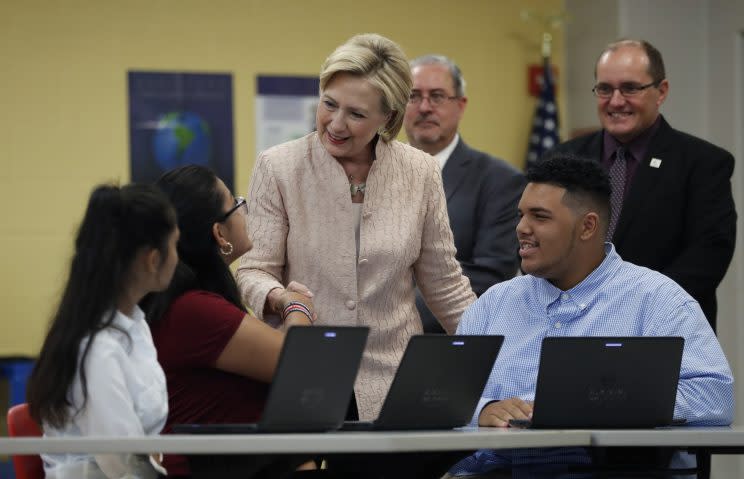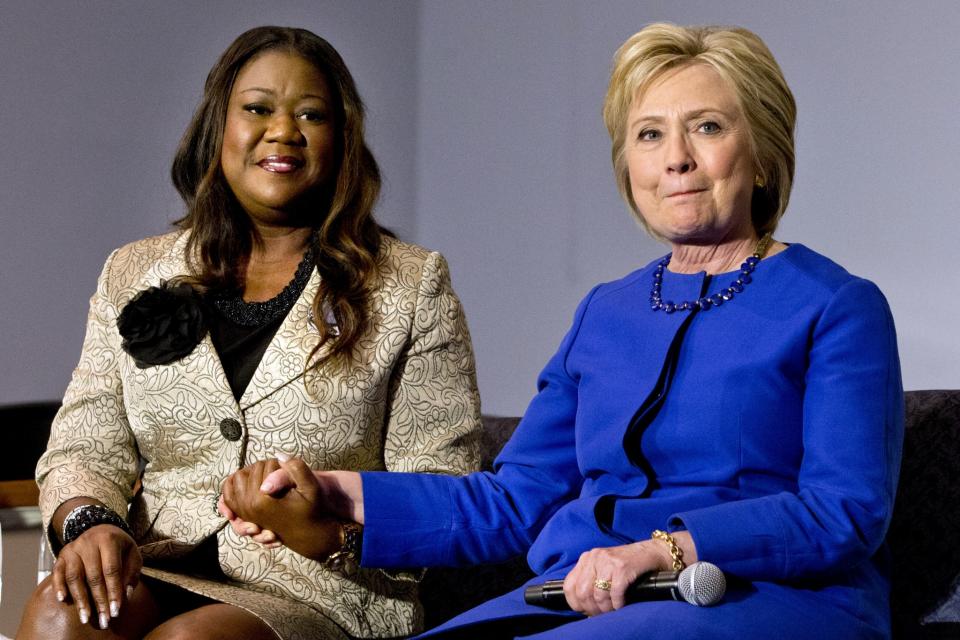Clinton’s artisanal campaign: Hillary has a highly specialized, hand-tailored voter outreach advantage


Donald Trump and the Republican Party have repeatedly announced plans to expand their efforts to reach out to a more diverse selection of voters. However, even as Trump faces dismal poll numbers with minorities, his campaign has no staff dedicated to reaching them, and Democratic presidential nominee Hillary Clinton is running a far more robust specialized voter outreach effort.’
Political operatives on both sides of the aisle told Yahoo News this is a major advantage for Clinton that could have a lasting impact on the political landscape.
Evan Siegfried, a Republican commentator and consultant, predicted falling behind in the outreach arms race could have dire implications for the GOP. In his recent book, GOP GPS, Siegfried made the case that the Republican Party cannot survive without doing more to reach millennial and “urban” voters. And in a conversation with Yahoo News last week, Siegfried said the party is falling far behind in this presidential race.
“The GOP, it’s not just being outgunned — they’ve been absolutely demolished,” Siegfried said. “That’s something that should worry us not just for this cycle, but for the next several.”
This type of focused outreach allows campaigns to make tailored pitches to maximize turnout in communities that are part of their base or make new inroads among voters where they’ve had trouble gaining traction. Specialized staffers can create advertising materials and have conversations with voters in their native languages. They can brainstorm programs for recruiting volunteers and supporters that are designed to appeal to a specific community. Specialized outreach staffers can also help identify the most important events and niche media outlets. And they can weigh in on policy and advise on what issues to focus on or how to frame positions in order to appeal to specific groups.
At Clinton’s headquarters in Brooklyn, the campaign told Yahoo News there are at least 54 staffers working on communications and outreach efforts tailored to Latinos, African-Americans, women, millennials, labor, Asian-Americans and Pacific Islanders, Muslims, veterans, Jews and “faith communities.” And the campaign also has staff doing specialized outreach in individual states.
Meanwhile, Trump’s campaign has no staffers who are focused on specific constituencies. Republican National Committee chief strategist Sean Spicer, who has been working with the campaign, said Trump has farmed this work out to the RNC.
“All of that right now for the most part is being run out of the RNC,” Spicer said, referring reporters to GOP national spokeswoman Lindsay Walters.
Walters said the RNC has staff and teams dedicated to engaging with voters in eight groups: Hispanics, African-Americans, millennials, veterans and military families, faith groups, Asians and Pacific Islanders, women and “conservative groups” — grassroots organizations and media outlets that communicate with the party’s base. Citing a reluctance to reveal aspects of party “strategy,” Walters would not specify how many staffers are involved with this effort.
Though Trump does not have his own specialized outreach staff, Walters said, these RNC staffers work “hand in glove” with the campaign. And she argued having the RNC run these programs for Trump is superior to Clinton’s approach because it is “more efficient and effective” and avoids “duplicating efforts.”
“When our teams are out working, we’re not only focused on engaging voters to turn out and vote for the top of the ticket, but also for the down-ballot races,” Walters said.
Walters claimed her counterparts at Democratic headquarters don’t “have the infrastructure or the organization in place” to do this kind of work, although TJ Helmstetter, a DNC spokesman, says they do.
Besides the Clinton campaign’s 54 outreach staffers, Helmstetter said, the Democratic National Committee has an 11-member team at its headquarters in Washington, D.C. The party’s national community engagement director oversees 10 staffers devoted to specialized outreach for African-Americans, Hispanics, youth, seniors, women, Asian-Americans and Pacific Islanders, Native Americans, people with disabilities, Jews, “veterans and military families” and LBGT voters.
Siegfried, the Republican author and consultant, said unequivocally that “the Democrats are outgunning us” in terms of specialized outreach. He compared the situation to the 2012 election, where Democrats were widely credited with having more sophisticated data and digital operations, an advantage that is often cited as a key factor in President Obama’s victory in that race.
“It’s the same thing with Obama and digital. In 2008 and 2012, he cleaned our clocks so thoroughly on it that smart operatives were going out and trying to figure out how we can not only equal Democrats digitally but ultimately overtake them. We should be doing the same with this,” Siegfried said.

Polls have shown Trump far behind Clinton among African-Americans, Latinos and younger voters. These types of numbers are clearly daunting for both Trump and the Republican Party, particularly since the population is growing younger and more diverse.
The RNC acknowledged these concerns in a highly touted autopsy report published after the 2012 race that argued the party needed to expand its efforts to woo younger voters and minorities. Siegfried said seeing Clinton and the Democrats build a stronger specialized outreach operation in the presidential race makes him fear that postmortem report was ignored.
“It’s basically like you told the captain of the Titanic, ‘You can change your course,’ days ahead of them hitting the iceberg, and the captain said, ‘No, we’re going to try our luck with the iceberg,’” Siegfried quipped.
Veteran Democratic operative Buffy Wicks, who started working for Obama’s campaign team in 2007, told Yahoo News the Clinton campaign has a “very sophisticated” specialty outreach program. Wicks ran Operation Vote, the arm of Obama’s 2012 campaign that was dedicated to engaging specific constituencies, and she said Clinton has an even stronger program.
“Each cycle it’s — at least on the Democratic side — become more and more advanced,” Wicks said of specialized outreach efforts. “In 2008 we did some of it, and we obviously took advantage of some of the key demographics that tended to support the president, like the African-American community. … But I think in ’12 you saw much more substantial outreach and programming toward, we internally called them the ‘Big Four,’ which were women, youth, African-Americans and Latinos. … I think in ’16 you’re seeing even more advancement.”
Wicks, who, as she put it, came “out of retirement” to work as Clinton’s state director in California ahead of this year’s primary, said the Clinton campaign has built on the advantage Democrats already had in Obama’s two general-election races. She described this as particularly important given the changing demographics of crucial battleground states.
“You’re seeing emerging Latino populations in places like Ohio and North Carolina,” Wicks said.
Clinton’s specialized-outreach staff has helped the campaign run multilingual programs. Wicks said that during the California primary the campaign ran phone banks in at least five languages, including Mandarin, Cantonese, Tagalog, Spanish and Vietnamese.
Moreover, having specialized teams has enabled the Clinton campaign to develop tailored programs and strategies for specific constituencies. In the African-American community, Clinton has stressed policies designed to address “systemic racism” as she campaigned alongside the so-called Mothers of the Movement, whose children were killed by the police. For Hispanics, the campaign has launched Mujeres in Politics, a phone banking and roundtable program developed by Latino staffers based on the idea that women are key forces to generate discussion and activism within that community. Late last month, the Clinton campaign held a call with what it identified as Eastern European community leaders in which they asked the listeners to help them identify “festivals,” “parades” and “conferences” where it would be important to have a visible presence.

A Clinton campaign aide who spoke to Yahoo News explained why specialized teams are effective for developing and implementing strategies.
“The best solutions for challenges facing communities draw on the knowledge of men and women who have direct ties to these communities. That is why we built an infrastructure during the primary and have expanded it for the general election to ensure that we have a wide reach and continue to invest in these communities,” the aide said.
Wicks went a step further and argued these programs can have an impact beyond this race. Along with maximizing turnout, Wicks said these specialized efforts can help Democrats in the long term by identifying and recruiting more people from diverse communities “who represent those communities and look like those communities.”
“You’re getting a more and more kind of professionalized campaign operative infrastructure, who are people that reflect America, very diverse staff who are people from those communities, which I think is really, really important,” Wicks said.
While Clinton is already doing well with many of the groups being targeted by her specialized outreach teams, her campaign’s efforts include some constituencies that are sometimes friendlier to the GOP, like veterans and religious Christians. Siegfried, the Republican consultant and commentator, said Trump and the GOP should be very worried to see Democratic outreach dipping into their base.
“That’s terrifying. You know, veterans have been very much the bread and butter of Republicans,” Siegfried said, adding, “we’re basically going to play defense on our home turf. We can’t expand while were playing defense at home.”


